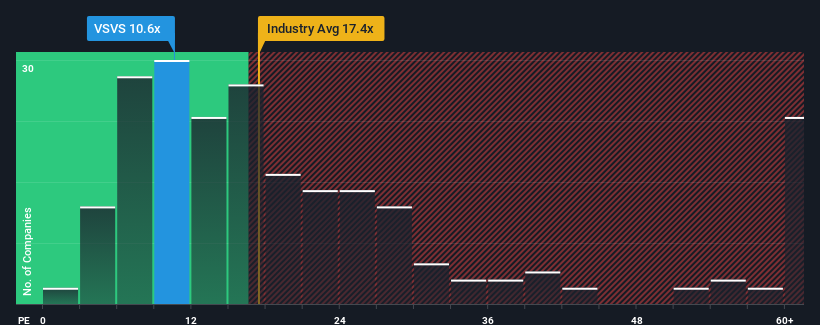
Vesuvius plc's (LON:VSVS) price-to-earnings (or "P/E") ratio of 10.6x might make it look like a buy right now compared to the market in the United Kingdom, where around half of the companies have P/E ratios above 17x and even P/E's above 30x are quite common. Although, it's not wise to just take the P/E at face value as there may be an explanation why it's limited.
Vesuvius could be doing better as its earnings have been going backwards lately while most other companies have been seeing positive earnings growth. It seems that many are expecting the dour earnings performance to persist, which has repressed the P/E. If you still like the company, you'd be hoping this isn't the case so that you could potentially pick up some stock while it's out of favour.
View our latest analysis for Vesuvius

Does Growth Match The Low P/E?
The only time you'd be truly comfortable seeing a P/E as low as Vesuvius' is when the company's growth is on track to lag the market.
If we review the last year of earnings, dishearteningly the company's profits fell to the tune of 35%. Still, the latest three year period has seen an excellent 77% overall rise in EPS, in spite of its unsatisfying short-term performance. So we can start by confirming that the company has generally done a very good job of growing earnings over that time, even though it had some hiccups along the way.
Looking ahead now, EPS is anticipated to climb by 10% per year during the coming three years according to the nine analysts following the company. Meanwhile, the rest of the market is forecast to expand by 13% per year, which is noticeably more attractive.
In light of this, it's understandable that Vesuvius' P/E sits below the majority of other companies. Apparently many shareholders weren't comfortable holding on while the company is potentially eyeing a less prosperous future.
What We Can Learn From Vesuvius' P/E?
Generally, our preference is to limit the use of the price-to-earnings ratio to establishing what the market thinks about the overall health of a company.
As we suspected, our examination of Vesuvius' analyst forecasts revealed that its inferior earnings outlook is contributing to its low P/E. Right now shareholders are accepting the low P/E as they concede future earnings probably won't provide any pleasant surprises. It's hard to see the share price rising strongly in the near future under these circumstances.
Before you settle on your opinion, we've discovered 2 warning signs for Vesuvius that you should be aware of.
You might be able to find a better investment than Vesuvius. If you want a selection of possible candidates, check out this free list of interesting companies that trade on a low P/E (but have proven they can grow earnings).
New: Manage All Your Stock Portfolios in One Place
We've created the ultimate portfolio companion for stock investors, and it's free.
• Connect an unlimited number of Portfolios and see your total in one currency
• Be alerted to new Warning Signs or Risks via email or mobile
• Track the Fair Value of your stocks
Have feedback on this article? Concerned about the content? Get in touch with us directly. Alternatively, email editorial-team (at) simplywallst.com.
This article by Simply Wall St is general in nature. We provide commentary based on historical data and analyst forecasts only using an unbiased methodology and our articles are not intended to be financial advice. It does not constitute a recommendation to buy or sell any stock, and does not take account of your objectives, or your financial situation. We aim to bring you long-term focused analysis driven by fundamental data. Note that our analysis may not factor in the latest price-sensitive company announcements or qualitative material. Simply Wall St has no position in any stocks mentioned.
About LSE:VSVS
Vesuvius
Provides molten metal flow engineering and technology services to steel and foundry casting industries worldwide.
Flawless balance sheet, undervalued and pays a dividend.
Similar Companies
Market Insights
Community Narratives



